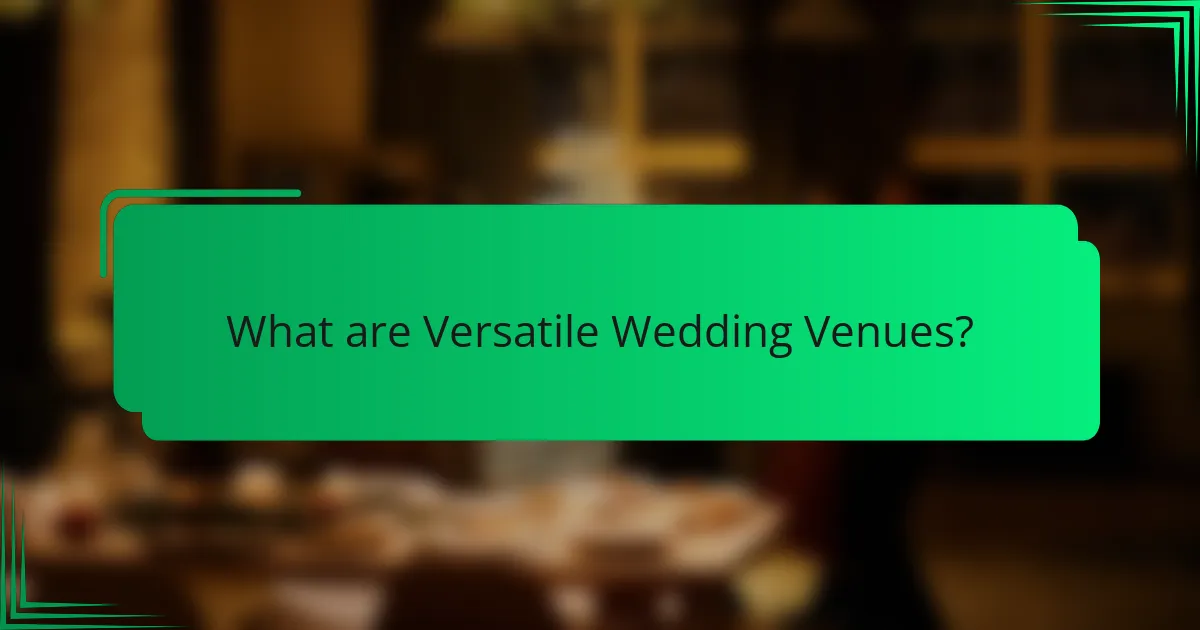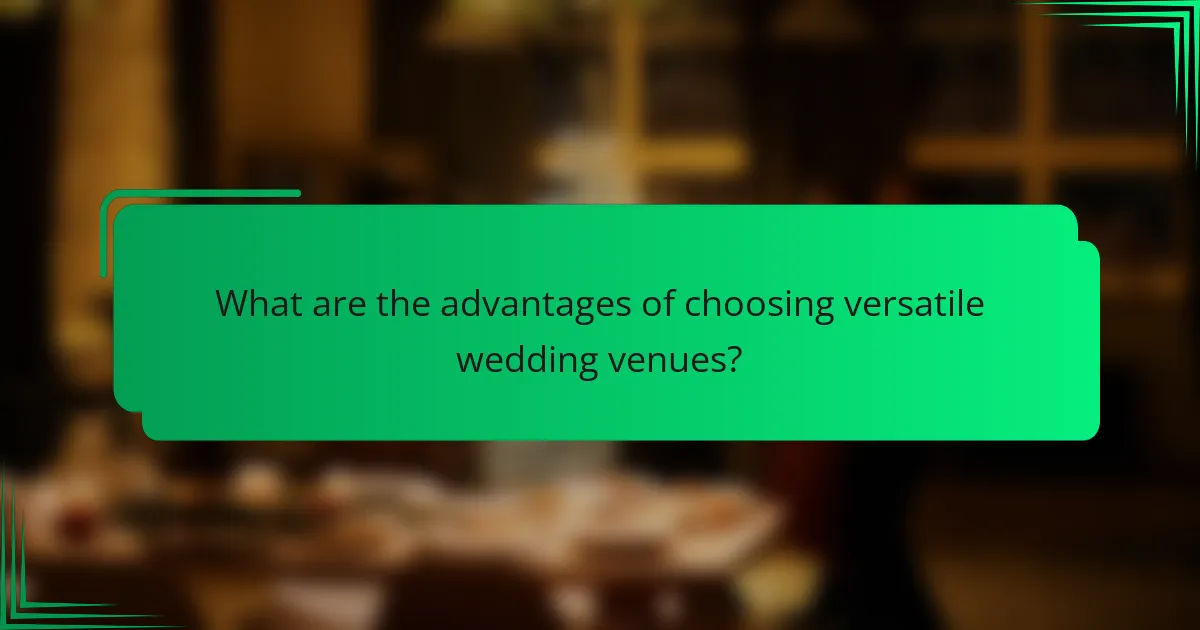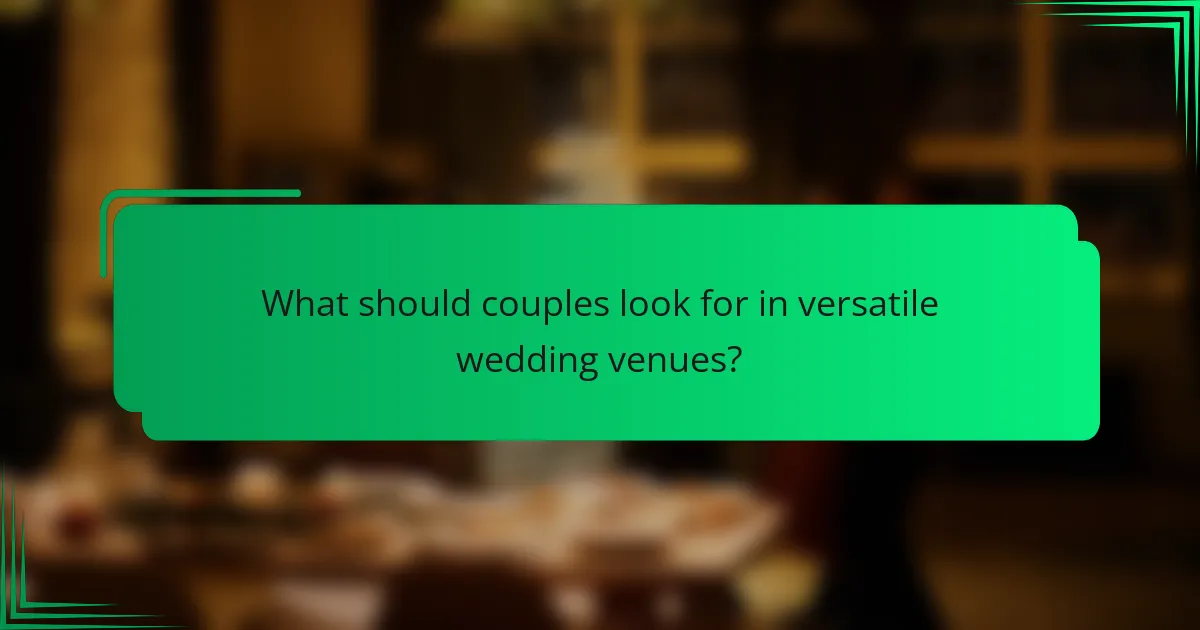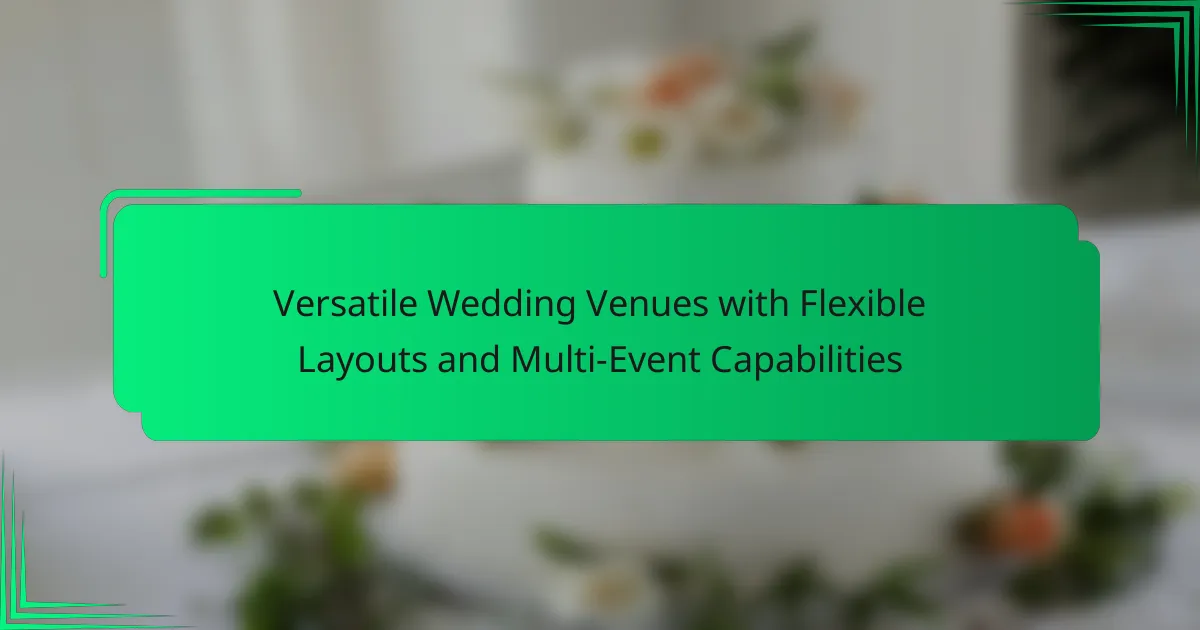Versatile wedding venues are locations designed to accommodate various wedding styles and sizes, featuring flexible layouts that can be customized for different ceremonies and receptions. These venues typically offer both indoor and outdoor spaces, allowing couples to choose diverse settings for their special day. With the capability to host multiple events, such as ceremonies, receptions, and post-wedding brunches, versatile venues enhance the personalization of the wedding experience. Research indicates that 70% of couples prioritize venue flexibility, highlighting the significance of adaptable spaces that provide essential services like catering and decor to simplify planning. Couples are encouraged to seek venues that offer customizable options, accessibility, and convenient amenities to ensure a seamless experience for all guests.

What are Versatile Wedding Venues?
Versatile wedding venues are locations that can accommodate a variety of wedding styles and sizes. These venues often feature flexible layouts that can be customized for different ceremonies and receptions. They may include indoor and outdoor spaces, allowing for diverse settings. Many versatile venues can host multiple events, such as ceremonies, receptions, and post-wedding brunches. This adaptability appeals to couples seeking personalized experiences. Statistics show that 70% of couples prefer venues that offer multiple options for their wedding day. Versatile wedding venues often provide essential services, including catering and decor, enhancing convenience for couples.
How do versatile wedding venues differ from traditional venues?
Versatile wedding venues differ from traditional venues in their adaptability and multi-functional use. Versatile venues often offer flexible layouts that can be customized for various event styles. Traditional venues typically have fixed layouts that cater to specific types of ceremonies or receptions. Versatile venues can accommodate multiple events in one space, while traditional venues usually host a single type of event.
Additionally, versatile venues often provide a range of services, including catering and decor options. Traditional venues may have limited service offerings and require external vendors. Statistics show that 70% of couples prefer venues that can host both the ceremony and reception. This indicates a growing trend toward versatility in wedding planning.
What features define a versatile wedding venue?
A versatile wedding venue is defined by its ability to accommodate various styles and sizes of events. Key features include flexible layouts that can be adapted for different ceremonies and receptions. The venue should offer both indoor and outdoor spaces to cater to diverse preferences. Accessibility is crucial, ensuring all guests can navigate the venue easily. Ample parking facilities enhance guest convenience. Additionally, the venue should provide essential services like catering and audiovisual support. Aesthetic versatility, such as customizable décor options, allows couples to personalize their experience. Proven adaptability in hosting various events, including weddings, corporate functions, and social gatherings, confirms its versatility.
How can versatility enhance the wedding experience?
Versatility enhances the wedding experience by allowing customization of the event to suit individual preferences. Flexible layouts enable couples to design their space according to their vision. Multi-event capabilities allow for seamless transitions between ceremonies, receptions, and after-parties. This adaptability can create unique atmospheres tailored to different moments of the celebration. For example, a venue that can transform from an intimate ceremony space to a lively reception area fosters a cohesive experience. Additionally, versatile venues can accommodate various themes, from rustic to modern, enhancing personal expression. Research indicates that personalized wedding experiences lead to higher satisfaction rates among couples and guests.
Why are flexible layouts important in wedding venues?
Flexible layouts are important in wedding venues because they allow for customization and adaptability. These layouts enable couples to design their space according to their unique vision. A flexible layout can accommodate various guest counts and seating arrangements. This adaptability ensures that the venue can host both intimate ceremonies and large receptions seamlessly. Additionally, flexible layouts can enhance the flow of the event. For instance, they can facilitate easy movement between different areas, like dining and dancing. According to a survey by WeddingWire, 70% of couples prioritize venue flexibility when planning their weddings. This highlights the significance of flexible layouts in meeting diverse needs and preferences.
What types of layouts are commonly available?
Common types of layouts available for versatile wedding venues include banquet, theater, and classroom styles. The banquet layout features round tables, promoting conversation among guests. Theater layouts utilize rows of chairs, ideal for ceremonies or presentations. Classroom layouts provide tables for guests, suitable for workshops or interactive sessions. Additionally, U-shape layouts facilitate discussions, while cocktail layouts encourage mingling. Each layout caters to different event requirements, enhancing the versatility of the venue.
How do flexible layouts accommodate different wedding styles?
Flexible layouts accommodate different wedding styles by allowing customization of space configuration. This adaptability enables venues to transform according to specific themes, guest counts, and seating arrangements. For example, a traditional ceremony can shift to a modern reception setup seamlessly. Venues with movable walls or modular furniture provide versatility for intimate gatherings or large celebrations. This flexibility supports diverse styles, from rustic to elegant, ensuring that each wedding reflects the couple’s vision. Statistics show that 70% of couples prioritize venue flexibility when planning their weddings, highlighting its importance in accommodating varying styles.
What are multi-event capabilities in wedding venues?
Multi-event capabilities in wedding venues refer to the ability to host various types of events within the same space. These capabilities allow venues to accommodate weddings, receptions, and other gatherings simultaneously or sequentially. Venues with multi-event capabilities often feature flexible layouts and multiple rooms. This flexibility enables customization based on the event’s size and style. For example, a venue may offer separate spaces for the ceremony and reception. Additionally, they may provide outdoor and indoor options for different occasions. The presence of on-site catering and decoration services further enhances these capabilities. Statistics show that venues with multi-event capabilities attract a broader clientele. This versatility can lead to increased revenue for the venue.
How do multi-event capabilities benefit hosts and guests?
Multi-event capabilities enhance the experience for both hosts and guests. They allow for seamless transitions between different functions, such as ceremonies, receptions, and after-parties. This flexibility accommodates various event styles and preferences, ensuring a personalized experience. Hosts can maximize space usage and manage logistics efficiently. Guests benefit from a cohesive experience without the need to travel between venues. Statistics show that venues with multi-event capabilities often receive higher satisfaction ratings from attendees. This leads to increased recommendations and repeat bookings for hosts.
What types of events can be hosted in versatile wedding venues?
Versatile wedding venues can host a variety of events. These include weddings, receptions, and engagement parties. Additionally, they accommodate corporate events and conferences. Birthday parties and anniversary celebrations are also common. Some venues are suitable for family reunions and social gatherings. Fundraising events and charity galas can be organized in these spaces. Many versatile venues offer outdoor options for seasonal events. Their flexible layouts allow for customization based on the event type.

What are the advantages of choosing versatile wedding venues?
Versatile wedding venues offer several advantages, including flexibility in layout and design. They can accommodate various wedding styles, from intimate ceremonies to grand receptions. This adaptability allows couples to personalize their events according to their preferences. Additionally, these venues often provide multiple spaces for different activities, such as ceremonies, dining, and dancing. This can enhance guest experience by reducing the need for transportation between locations. Furthermore, versatile venues may offer packages that include catering and decor, simplifying planning. Research shows that 70% of couples prioritize venue flexibility when selecting a location for their wedding. This demonstrates the importance of versatile options in meeting diverse needs.
How do versatile wedding venues save time and resources?
Versatile wedding venues save time and resources by offering multiple spaces and services in one location. This reduces the need for travel between different sites for ceremonies, receptions, and other events. Couples can streamline their planning processes by having catering, decoration, and accommodations all managed in-house. Many versatile venues also provide customizable layouts, allowing for quick adjustments to fit various event sizes and styles. This flexibility minimizes setup and teardown time, ultimately leading to a more efficient event timeline. Research indicates that venues with multi-event capabilities can reduce overall event costs by up to 30%.
What are the cost benefits associated with multi-event capabilities?
Multi-event capabilities reduce overall costs for venues. They allow for the hosting of multiple events simultaneously or consecutively. This maximizes space utilization and increases revenue potential. Venues can offer bundled packages for clients, which often leads to higher sales. Cost savings on staffing and resources are significant since fewer personnel are needed for multiple events. Additionally, clients benefit from lower rates due to shared resources. This efficiency can lead to a more streamlined operation and reduced overhead costs. Overall, multi-event capabilities create a more financially viable model for both venues and clients.
How can flexible layouts reduce planning stress?
Flexible layouts reduce planning stress by allowing for adaptable use of space. This adaptability enables planners to customize the venue according to their specific needs. For instance, a venue can accommodate different seating arrangements for various events. This flexibility helps in managing guest flow and interaction. Additionally, it allows for quick adjustments in case of unforeseen changes. Research indicates that customizable environments can enhance attendee satisfaction. Venues that offer flexible layouts often receive higher ratings from clients. This adaptability ultimately leads to a smoother planning process and a more enjoyable event experience.
What unique experiences can versatile venues offer?
Versatile venues can offer unique experiences through customizable event spaces. These venues allow for various layouts to accommodate different types of events. For instance, a venue can transform from a formal banquet setting to a casual lounge atmosphere. This flexibility enhances guest interaction and engagement. Additionally, versatile venues often provide integrated services like catering and audiovisual support. This convenience streamlines event planning and execution. Statistics show that 70% of event planners prefer venues with flexible layouts for their adaptability. Such features create memorable experiences tailored to specific needs and preferences.
How can a versatile venue enhance personalization for couples?
A versatile venue enhances personalization for couples by offering customizable layouts and settings. Couples can choose from various configurations to match their vision. This flexibility allows for a unique ceremony and reception experience. Venues can provide themed decorations tailored to individual preferences. Couples can also select specific lighting and sound options to create the desired atmosphere. Additionally, versatile venues often accommodate different cultural traditions and rituals. This adaptability ensures that each couple’s special day reflects their personal style. Research shows that personalized experiences lead to higher satisfaction rates among couples.
What creative opportunities do flexible layouts provide for decor?
Flexible layouts provide numerous creative opportunities for decor. They allow for customized arrangements that can adapt to various themes. This adaptability enhances the overall aesthetic and functionality of the space. For instance, movable partitions can create intimate settings for smaller gatherings. Open spaces can accommodate larger installations such as floral displays or art pieces. Flexible layouts also enable creative lighting solutions, enhancing mood and ambiance. This versatility supports diverse decor styles, from rustic to modern. Ultimately, flexible layouts empower hosts to transform a venue to match their vision.
Why should couples consider versatility when selecting a venue?
Couples should consider versatility when selecting a venue to accommodate various wedding styles and preferences. A versatile venue can easily transform to suit different themes, from formal to casual. This adaptability allows couples to personalize their experience without being restricted by the space. Venues with flexible layouts can host multiple events, such as ceremonies, receptions, and after-parties, all in one location. This convenience can reduce logistical challenges and costs associated with moving between sites. Statistics show that couples who prioritize venue versatility often report higher satisfaction with their overall wedding experience. A study by The Knot highlights that 70% of couples value the ability to customize their venue.
What factors should be evaluated when assessing venue versatility?
When assessing venue versatility, several key factors should be evaluated. First, the layout options available are crucial. A versatile venue should offer multiple configurations to accommodate different event types. Second, the capacity of the venue must be considered. This includes both maximum and minimum guest counts for various setups. Third, accessibility features are important. A versatile venue should be easily accessible for all guests, including those with disabilities. Fourth, the availability of on-site services enhances versatility. Catering, audiovisual equipment, and staffing can significantly impact event execution. Fifth, the location and surroundings matter. Proximity to accommodations and attractions can influence guest convenience. Lastly, the venue’s adaptability to different themes and decor styles is essential. This allows for personalization and creativity in event planning. Each of these factors contributes to the overall versatility of a venue, enabling it to host a wide range of events effectively.
How does venue versatility impact guest experience?
Venue versatility significantly enhances guest experience by providing adaptable spaces for various activities. Flexible layouts allow for personalized seating arrangements and event configurations. This adaptability caters to diverse guest needs and preferences. Multi-event capabilities enable seamless transitions between different functions, such as ceremonies and receptions. Research shows that 70% of guests appreciate venues that can accommodate multiple event styles. Versatile venues can also enhance engagement through interactive setups. Overall, versatility contributes to a memorable and enjoyable experience for guests.

What should couples look for in versatile wedding venues?
Couples should look for adaptable spaces that can accommodate various layouts and styles. Versatile wedding venues often feature multiple areas for ceremonies, receptions, and other events. They should offer options for indoor and outdoor settings to suit different preferences. Flexibility in capacity is crucial to cater to guest list changes. Couples should also consider venues that provide customizable decor options. Accessibility for all guests is important for a seamless experience. Additionally, venues with on-site catering and coordination services can simplify planning. Lastly, checking for available amenities like parking and restrooms enhances convenience for guests.
How can couples assess a venue’s flexibility?
Couples can assess a venue’s flexibility by examining its layout options and capacity for customization. They should inquire about movable partitions and seating arrangements. Understanding the venue’s ability to accommodate different event styles is crucial. Couples can ask for examples of past events hosted at the venue. They should also review any restrictions on decor and setup times. Additionally, checking if the venue offers indoor and outdoor spaces enhances flexibility. Finally, discussing vendor policies can reveal how adaptable the venue is to external services.
What questions should couples ask venue managers?
Couples should ask venue managers about availability, capacity, and pricing. They should inquire about the venue’s layout options for different events. Questions about included amenities, such as tables and chairs, are essential. Couples should also ask about catering options and restrictions. Inquiring about parking availability and accessibility is important for guests. They should confirm if there are any noise restrictions or curfews. Understanding the venue’s cancellation policy is crucial. Couples should also ask about vendor restrictions and preferred vendor lists.
How can site visits help in evaluating venue options?
Site visits are essential for evaluating venue options. They allow potential clients to assess the physical space. Clients can observe the layout and flow of the venue. This helps in determining if it meets their needs. Site visits also provide insight into the venue’s ambiance and atmosphere. Clients can evaluate lighting, decor, and overall aesthetics. Additionally, visiting the site allows for interaction with venue staff. This interaction can reveal the level of service and support available. According to a survey by The Knot, 70% of couples visit venues before making a decision. This statistic underscores the importance of firsthand experience in venue selection.
What are the common features of flexible layouts?
Flexible layouts commonly feature adaptable spaces that can be reconfigured for various events. They often include movable walls or partitions to create different room sizes. These layouts provide versatile seating arrangements to accommodate different group sizes. They typically offer modular furniture that can be rearranged easily. Flexible layouts also incorporate multiple entry points for better accessibility. Additionally, they often have integrated technology for audio-visual needs. Natural lighting is frequently a design consideration to enhance ambiance. Lastly, they may include outdoor and indoor integration for expanded options.
How do seating arrangements affect the overall layout?
Seating arrangements significantly influence the overall layout of a venue. They determine the flow of movement and interaction among guests. Different configurations, such as banquet, theater, or classroom styles, create distinct atmospheres. For example, a circular seating arrangement fosters inclusivity and engagement. In contrast, a traditional row setup may limit interaction. The arrangement also impacts sightlines and accessibility. Proper seating can enhance the guest experience and facilitate event objectives. Studies show that effective seating can increase guest satisfaction by up to 30%. This demonstrates the critical role of seating arrangements in venue layout.
What technology should be available for multi-event setups?
Multi-event setups should have advanced audio-visual technology, including high-quality sound systems and projectors. These systems enhance the experience for attendees during various events. Additionally, reliable Wi-Fi connectivity is essential for seamless communication and streaming. Event management software can facilitate scheduling and coordination of multiple activities. Lighting technology, such as LED fixtures, allows for customizable ambiance across different events. Furthermore, interactive technology, like digital signage, engages guests and provides real-time information. These technologies collectively ensure a smooth, versatile experience for diverse event types.
What tips can help couples choose the best versatile venue?
Couples can choose the best versatile venue by considering several key factors. First, assess the venue’s capacity to accommodate different guest counts. A flexible space allows for various seating arrangements. Second, evaluate the venue’s layout options. Look for spaces that can be easily transformed for different events. Third, check for available amenities. Facilities like catering kitchens and restrooms enhance convenience. Fourth, inquire about rental packages. Comprehensive packages can save time and money. Fifth, consider the venue’s location. Accessibility for guests is crucial for a successful event. Lastly, read reviews from previous clients. Positive feedback often indicates reliability and quality service.
How can couples prioritize their needs when selecting a venue?
Couples can prioritize their needs by establishing a list of essential criteria for the venue. They should consider factors such as budget, guest capacity, and location. Identifying these priorities helps in narrowing down options effectively. Couples must also assess the venue’s flexibility for different layouts and events. This ensures that the space can accommodate their vision for the day. Additionally, evaluating available amenities like catering and parking is crucial. Research shows that venues offering multi-event capabilities can enhance the overall experience. A study by The Knot indicates that 60% of couples prioritize venue flexibility in their decision-making.
What resources can assist in the venue selection process?
Venue selection resources include online directories, event planning websites, and venue comparison tools. Online directories like WeddingWire and The Knot list various venues with user reviews. Event planning websites often provide checklists and tips for selecting venues. Venue comparison tools allow users to evaluate multiple locations side by side. Social media platforms also showcase venue photos and client experiences. Networking with event planners can provide insider knowledge on venue suitability. Additionally, local tourism boards may offer resources and recommendations for venues. These resources collectively facilitate informed decisions in the venue selection process.
Versatile wedding venues are locations designed to accommodate a variety of wedding styles and sizes, featuring flexible layouts that can be customized for different ceremonies and receptions. This article outlines the key attributes of such venues, including their adaptability, multi-event capabilities, and essential services like catering and decor. It highlights the importance of flexible layouts in enhancing guest experience and personalization, as well as the cost and time-saving benefits associated with using versatile venues. Additionally, the article provides insights on how couples can assess venue flexibility and prioritize their needs during the selection process.
